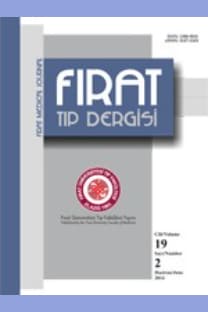Obezite ve Genetik
Obezite kardiovasküler hastalık veya diyabet gibi bazı önemli hastalıkların majör nedenlerinden biri olarak suçlanan ve dünya çapında artış gösteren bir problemdir. Besinlerin bolluğu ve beslenme tarzının değişmesi sonucunda obezite dünyada epidemik duruma gelmiştir ve ciddi sağlık problemlerine yol açmaktadır. Vücutta normalden fazla miktarda yağ dokusunun olması sebebiyle gelişir, çok sayıda faktöre bağlıdır. Obezitenin en önemli risk faktörlerini fiziksel aktivitede azalma, beslenme alışkanlıkları, yaş, kadın cinsiyet, eğitim düzeyi, evlilik, doğum sayısı ve genetik oluşturmaktadır. Obezitede genetik faktörlerin rolü komplekstir. İnsanlarda obezite ya monogenik sendromlar olarak veya multifaktoryel kalıtım modeline uymaktadır. Monogenik yani tek genin neden olduğu obezite, nadir görülür ve genetik sendromlarla birlikte olabileceği gibi tek başına da görülebilir. Poligenik obezite, obezitenin en yaygın görülen genetik versiyonu olup, multifaktoryel kalıtım modeli gösterir. Poligenik obezite genler, çevre, davranış ve hepsinin birbiriyle etkileşiminin bir sonucu olarak ortaya çıkar.
Obesity and Genetics
Obesity is an increasing problem around the world and it is blamed to be one of the major causes of some serious diseases such as diabetes mellitus or cardiovascular diseases. Obesity has become epidemic situation in the world as a result of abundance of nutrients and dietary changes and it leads to serious health problems. It occurs due to more body fat accumulation than normal levels, and is associated with many factors. Important risk factors of obesity are dietary habits, female sexualty, age, education, marriage, parity and genetic inheritance. The role of genetic factors in obesity is complex. In humans, obesity occurs either as monogenic syndromes or reflects a multifactorial model of inheritance. Monogenic obesity with an other definition, one gene related obesity is extremely rare and seen together with other genetic disorders. Polygenic obesity is the most common genetic version of obesity, and it presents a multifactorial inheritance pattern. Polygenic obesity occurs as a consequence of the interaction of the genes, environment, behavior with each other.
___
- Prevention and management of the global epi-demic of obesity. Report of the WHO Consulta-tion on Obesity (Geneva: WHO, June, 3-5, 1997).
- Bougneres P. Genetics and obesity and type 2 diabetes. Diabetes 2002; 51: 3-5.
- Allison DB, Kaprio J, Korkeila M, et al. The heritability of body mass index among an inter-national sample of monozygotic twins reared apart. Int J Obes Relat Metab Disord 1996; 20: 501-6.
- Reilly JJ, Armstrong J, Dorosty AR, et al. Early life risk factors for obesity in childhood: cohort study. BMJ 2005; 330: 1357-9.
- Semerci NC. Obezite ve genetik. Gülhane Tıp Dergisi 2004; 46: 353-9.
- Mutch DM, Clement K. Genetics of human obesity. Best Pract Res Clin Endocrinol Metab 2006; 20: 647-64.
- Farooqi IS. Genetic and hereditary aspects of childhood obesity. Best Pract Res Clin Endocri-nol Metab 2005; 19: 359-74.
- Bell CG, Walley AJ, Froguel P. The genetics of human obesity. Nat Rev Genet 2005; 6: 221- 34.
- Chung WK, Leibel RL. Molecular physiology of syndromic obesities in humans. Trends En-docrinol Metab 2005; 16: 267-72.
- Horsthemke B, Buiting K. Imprinting defects on human chromosome 15. Cytogenet Genome Res 2006; 113: 292-9.
- Clement K. Genetics of human obesity. CR Biologies 2006; 329: 608-22.
- Katsanis N, Lupski JR, Beales PL. Exploring the molecular basis of Bardet-Biedl syndrome. Hum Mol Geneti 2001; 10: 2293-9.
- 1Badano JL, Mitsuma N, Beales PL, et al. The ciliopathies: an emerging class of human gene-tic disorders. Annu Rev Genomics Hum Genet 2006; 7: 125-48.
- Sözen MA. Obezite ve Obezitenin Genetiği, Kocatepe Tıp Dergisi 2006; 7: 1-11.
- Rabah MS, Doaa IS. Genetic of Obesity. The Egyptian Journal of Medical Human Genetics 2012; 13: 11-7.
- Proenza AM, Poissonnet CM, Ozata M, et al. Association of sets of alleles of genes encoding beta3-adrenoreceptor, uncoupling protein 1 and lipoprotein lipase with increased risk of metabo-lic complications in obesity. Int J Obes Relat Metab Disord 2000; 24: 93-100.
- Linne Y, Dahlman I, Hoffstedt J. b1-Adrenoceptor gene polymorphism predicts long-term changes in body weight. Int J Obes 2005; 29: 458-62.
- Kebapcı N. The genetics of obesity. Turkiye Klinikleri J Int Med Sci 2005; 1: 9-13.
- Duman BS, Kayhan FE, Sesal C. Genetics of obesity: Medical education. Turkiye Klinikleri J Med Sci 2009; 29: 520-5.
- Cheung WW, Mao P. Recent advances in obe-sity: genetics and beyond. ISRN Endocrinol. 2012; 2012: 536-5.
- Rankinen T, Zuberi A, Chagnon YC, et al. The human obesity gene map: the 2005 update. Obe-sity (Silver Spring) 2006; 14: 529-644.
- ISSN: 1300-9818
- Başlangıç: 2015
- Yayıncı: Fırat Üniversitesi Tıp Fakültesi
